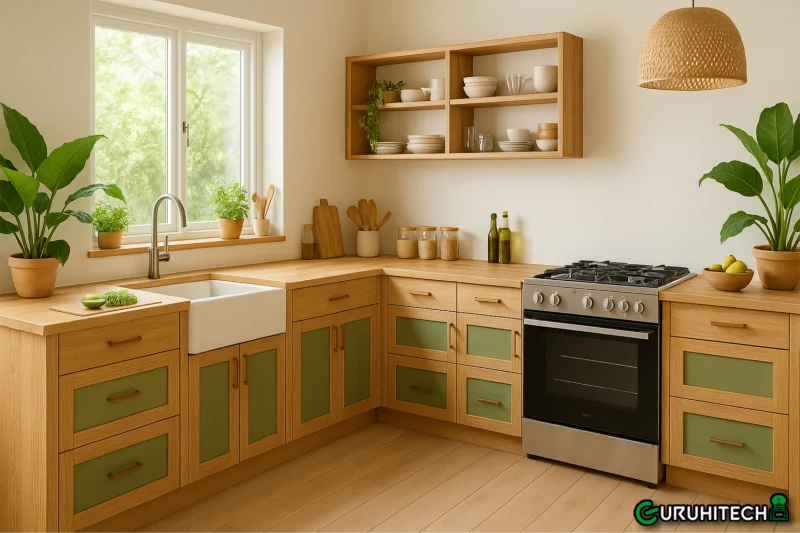Sustainable Kitchen Design: Eco-Friendly Choices in Countertops and Cabinets

In recent years, the emphasis on sustainable living has permeated various aspects of our daily lives, with home design being no exception. The kitchen, often considered the heart of the home, presents numerous opportunities for incorporating eco-friendly materials and practices. From selecting sustainable countertops to choosing environmentally responsible cabinetry, homeowners can make choices that benefit both their living spaces and the planet.
The Importance of Sustainable Materials
Sustainable materials are those that have a minimal impact on the environment throughout their lifecycle—from production to disposal. In the context of kitchen design, this means opting for materials that are responsibly sourced, durable, and recyclable or biodegradable. By choosing such materials, homeowners contribute to reducing deforestation, lowering carbon emissions, and minimizing landfill waste
Eco-Friendly Countertop Options
Quartz Countertops
Quartz countertops have gained popularity not only for their durability and aesthetic appeal but also for their eco-friendly attributes. Manufactured using a combination of natural quartz and recycled materials, these countertops are non-porous, reducing the need for harsh chemical cleaners. Their long lifespan means fewer replacements, contributing to less waste over time.
Recycled Glass Countertops
Made from post-consumer recycled glass, these countertops offer a unique and vibrant appearance. The production process consumes less energy compared to traditional materials, and the use of recycled content diverts waste from landfills. Additionally, these surfaces are durable and easy to maintain.
Bamboo Countertops
Bamboo is a rapidly renewable resource, making it an excellent choice for eco-conscious homeowners. Also bamboo countertops are not only sustainable but also provide a warm, natural look to the kitchen. They are lightweight, strong, and resistant to moisture, making them suitable for various kitchen applications.
Sustainable Cabinetry Choices
Reclaimed Wood Cabinets
Utilizing reclaimed wood for cabinetry is an effective way to reduce environmental impact. This approach repurposes wood from old buildings or furniture, giving it new life and character. Reclaimed wood cabinets often feature unique textures and grains, adding a rustic charm to the kitchen.
Bamboo Cabinets
Similar to bamboo countertops, bamboo cabinets are a sustainable alternative to traditional hardwoods. They are lightweight, durable, and resistant to pests and moisture. Bamboo’s rapid growth rate and renewability make it an environmentally friendly choice for cabinetry.
FSC-Certified Wood Cabinets
The Forest Stewardship Council (FSC) certification ensures that the wood used in cabinetry comes from responsibly managed forests. FSC-certified wood cabinets provide homeowners with the assurance that their choices support sustainable forestry practices and biodiversity conservation. For those seeking sustainable kitchen cabinets in Long Island, options like FSC-certified wood and bamboo offer both style and environmental responsibility.
Low-VOC Finishes and Adhesives
Volatile Organic Compounds (VOCs) are chemicals found in many paints, finishes, and adhesives that can off-gas harmful pollutants into the home environment. Opting for low-VOC or VOC-free products in kitchen cabinetry and finishes contributes to better indoor air quality and reduces health risks associated with chemical exposure.
Energy-Efficient Lighting and Appliances
Incorporating energy-efficient lighting, such as LED fixtures, and selecting Energy Star-rated appliances can significantly reduce a kitchen’s energy consumption. These choices not only lower utility bills but also decrease the overall carbon footprint of the household.
Water-Saving Fixtures
Installing water-saving fixtures, like low-flow faucets and aerators, helps conserve water without compromising functionality. These fixtures are easy to install and contribute to sustainable water management in the kitchen.
Waste Reduction Strategies
Implementing waste reduction strategies, such as composting organic waste and recycling materials, further enhances the sustainability of the kitchen. Designing spaces that accommodate separate bins for compost, recycling, and trash encourages responsible waste disposal habits.
The Role of Professional Guidance
Collaborating with experienced professionals can streamline the process of designing a sustainable kitchen. BNJ Granite & Cabinets offers expertise in selecting eco-friendly materials and implementing sustainable design practices. Their knowledge ensures that homeowners make informed choices that align with both environmental goals and personal aesthetics.
Conclusion
Designing a sustainable kitchen involves thoughtful selection of materials and practices that minimize environmental impact. By choosing eco-friendly countertops, sustainable cabinetry, energy-efficient appliances, and implementing waste reduction strategies, homeowners can create kitchens that are both functional and environmentally responsible. Engaging with professionals like BNJ Granite & Cabinets can provide valuable insights and assistance in achieving a kitchen design that supports a sustainable lifestyle.
Ti potrebbe interessare:
Segui guruhitech su:
- Google News: bit.ly/gurugooglenews
- Telegram: t.me/guruhitech
- X (Twitter): x.com/guruhitech1
- Bluesky: bsky.app/profile/guruhitech.bsky.social
- GETTR: gettr.com/user/guruhitech
- Rumble: rumble.com/user/guruhitech
- VKontakte: vk.com/guruhitech
- MeWe: mewe.com/i/guruhitech
- Skype: live:.cid.d4cf3836b772da8a
- WhatsApp: bit.ly/whatsappguruhitech
Esprimi il tuo parere!
Ti è stato utile questo articolo? Lascia un commento nell’apposita sezione che trovi più in basso e se ti va, iscriviti alla newsletter.
Per qualsiasi domanda, informazione o assistenza nel mondo della tecnologia, puoi inviare una email all’indirizzo [email protected].
Scopri di più da GuruHiTech
Abbonati per ricevere gli ultimi articoli inviati alla tua e-mail.
